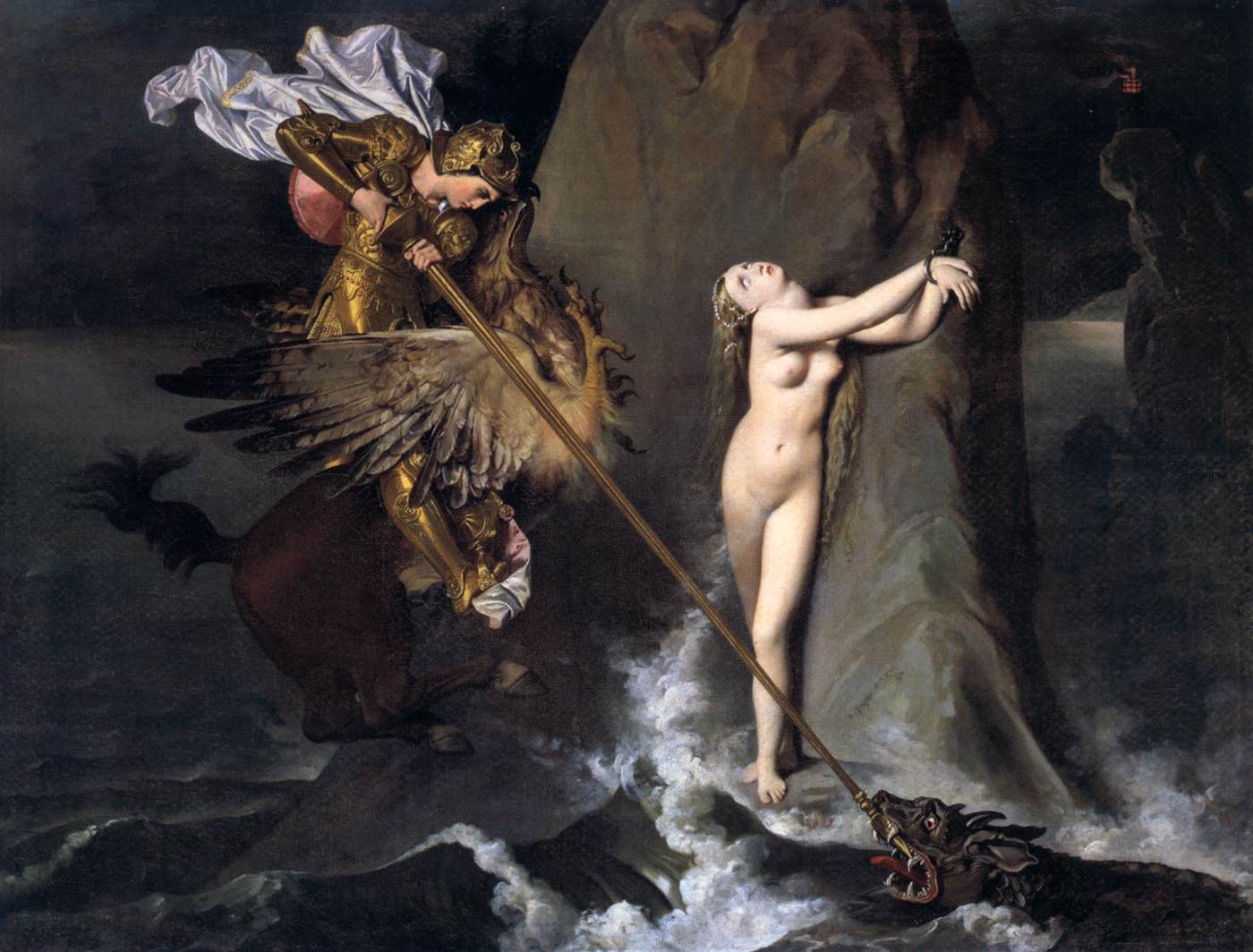Tuesday, February 15, 2011
Roger Freeing Angelica -- Ingres
LARGER VERSION VIEWABLE HERE. I WOULD ADVISE YOU LOOK AT IT, BECAUSE IT IS BEAUTIFUL
And the not-whatsoever-related poem to accompany the painting: La Belle Dame Sans Merci, by Keats:
Oh what can ail thee, knight-at-arms,
Alone and palely loitering?
The sedge has withered from the lake,
And no birds sing.
Oh what can ail thee, knight-at-arms,
So haggard and so woe-begone?
The squirrel's granary is full,
And the harvest's done.
I see a lily on thy brow,
With anguish moist and fever-dew,
And on thy cheeks a fading rose
Fast withereth too.
I met a lady in the meads,
Full beautiful - a faery's child,
Her hair was long, her foot was light,
And her eyes were wild.
I made a garland for her head,
And bracelets too, and fragrant zone;
She looked at me as she did love,
And made sweet moan.
I set her on my pacing steed,
And nothing else saw all day long,
For sidelong would she bend, and sing
A faery's song.
She found me roots of relish sweet,
And honey wild, and manna-dew,
And sure in language strange she said -
'I love thee true'.
THE REST OF THE POEM CAN BE FOUND HERE
Friday, February 11, 2011
The Death of Leonardo Da Vinci -- Ingres
Feel free to compare to the Death of Marat, the Burial of Atala (both previously featured!), and the Death of General Wolfe by Benjamin West. Here's a poem by Dylan Thomas that befits these macabre subjects:
And death shall have no dominion.
Dead mean naked they shall be one
With the man in the wind and the west moon;
When their bones are picked clean and the clean bones gone,
They shall have stars at elbow and foot;
Though they go mad they shall be sane,
Though they sink through the sea they shall rise again;
Though lovers be lost love shall not;
And death shall have no dominion.
And death shall have no dominion.
Under the windings of the sea
They lying long shall not die windily;
Twisting on racks when sinews give way,
Strapped to a wheel, yet they shall not break;
Faith in their hands shall snap in two,
And the unicorn evils run them through;
Split all ends up they shan't crack;
And death shall have no dominion.
And death shall have no dominion.
No more may gulls cry at their ears
Or waves break loud on the seashores;
Where blew a flower may a flower no more
Lift its head to the blows of the rain;
Though they be mad and dead as nails,
Heads of the characters hammer through daisies;
Break in the sun till the sun breaks down,
And death shall have no dominion.
Friday, February 4, 2011
Romanticism: Caspar David Friedrich
Edmund Burke's notion of nature's sublime power to evoke a sense of mystery and loss of self is most consistently expressed in the paintings of the German Romantic, Caspar David Friedrich. For Friedrich, the sublime included the appeal of lunar folklore, myth, and German nationalism. He was particularly attracted to the theme of figures contemplating the moon, like the above painting, Moonrise over the Sea. Notice that the figures are silhouetted so that their identity becomes absorbed into the forms of nature. This sense of unity with nature, compounded by the haunting setting, conveys the figures' Romantic character.
The above painting, The Stages of Life, is a meditation on the artist's own mortality, depicting five ships at various distances from the shore. The foreground similarly shows five figures at different stages of life.
Subscribe to:
Posts (Atom)



